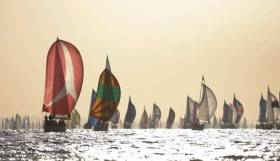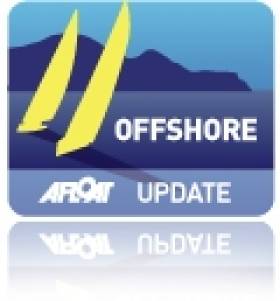Displaying items by tag: Island Sailing Club
UK's Round the Island Race Appoint Commercial Developers
The Island Sailing Club (ISC) in Cowes, organisers of the prestigious annual Round the Island Race off the Isle of Wight, has appointed Catalyst Consultants to act as its commercial partnerships agency. It's a move that provides an insight into how Irish events and regattas might need to look to attract high level sponsorship into the future.
The firm Catalyst is working with the ISC developing the commercial programme for the 2017 race onwards. Catalyst is undertaking a commercial review of how the Round the Island Race is structured as a brand partnerships platform and developing a new commercial programme and brand proposition to take the race forward, not only as one of the great sailing events and yacht racing spectacles but as a major mass participation sports brand
Speaking about the appointment on behalf of the Island Sailing Club, Dave Atkinson said: "Of all the agencies and commercial rights specialists that we talked to, Catalyst demonstrated not only fresh thinking and creativity but also a real empathy with where the club and the race is now and where it could go in the future. They bring to the project their wide experience and a great set of skills, and also go about things in a mature, sensitive way. We're delighted to be working with them."
Joe Bruce, Catalyst Director and co-founder commented: "There is significant opportunity to build on the enormous heritage, popularity and profile that the Round the Island Race has achieved in its 80 year history. As the biggest race of its type anywhere in the world and one of the top four mass participation sports events in the UK, there is a great potential to grow the Round the Island proposition and to create a brand and consumer engagement platform that is genuinely differentiated and powerful."
Big Winds for 80th Round the Island Race
Guests included Commodore of the Race hosts, the Island Sailing Club, Mr Rod Nicholls, Dame Ellen MacArthur, Ben Ainslie, Mike Perham and Jessica Watson, Tom Richardson, Julian Everitt, and Raymarine's weather guru Libby Greenhalgh.
Direct quotes from those interviewed at today's press conference:
Ellen MacArthur
"I think this Race is special because I live on the Isle of Wight, that is a big reason for me. Also, it was one of the first races I did in my Mini Transat boat and it's around the Isle of Wight which is beautiful. I think what has made it special for me over the last few years is because of the Ellen MacArthur Cancer Trust and I cannot think of a better way of racing round the Island than with these young people who are a) having fun, and b) truly inspirational.
"The Cancer Trust is a very special charity; we help young people cope with their illness by taking them out on the water and building their confidence. Everyone who sails knows just how special it is to be on the water because it is an amazing feeling of freedom. I think that having 1,908 boats racing tomorrow and if everyone is aware of what we do and supports us in some way, that makes a huge amount of difference.
"First and foremost, the huge benefit the Ellen MacArthur Cancer Trust gets from this Race is the young people out there having an adventure, and it really is an adventure because it is 50 miles starting and finishing in the same place. It is an amazing opportunity for those people and they love it. But is also important for us to be the official charity for the Round the Island Race because to have the support of the race, thousands and thousands of sailors out there all taking part in the JP Morgan Asset Management Round the Island Race, and they feel like they are all sailing for the Trust and that was crucial to us and that is something we are going to build up over the years but to be here and have that fundraising in what are difficult financial times is absolutely key."
David Poskitt – EMCT sailor
"I did the Round the Island Race last year so I know more or less what to expect. Sailing with the Trust sort of proves to me that because I have an illness it doesn't mean I can't take part in sports like sailing. Also, because there's a lot of teamwork involved in those you sail with, you build up great friendships."
Gary Copeland from Derbyshire– was the record-breaking entry at number 1876 (final entry figure is 1908)
"We have a Cowes Classic, built in 1962 next to Lallows Boatyard in Cowes. I've never ever done it before but my sister Gill has, so she's the expert. We are really looking forward to being part of this amazing event. Our boat is based at East Cowes but we commute every three weeks from Derbyshire."
Julian Everett – Racing Shallot, sister ship to Glass Onion.
"I have won the Gold Roman Bowl once in Glass Onion in 1982. As far as favourable conditions are concerned I really don't think it matters. It doesn't matter if it is blowing hard or light. You don't race anybody else you just try and get round as fast as you can."
Richard Simmonds: "In some ways over the past 80 years, everything's changed but nothing has changed at all, and a lot of that is due to where we are standing right now and the people of this Club."
The Charity Cup is presented for the most money raised for the charity by an individual. Dennise Shepherd raised £6,000 for Breast Cancer Care for her 201 Race and she wins the Charity Cup. To a round of applause Dennise said, "I feel a bit of a fraud because my husband and my parents did most of the fund raising while I just had a lot of fun."
Gold Roman Bowl winners
Tom Richardson 1965 – "We won on Firebrand which was built in Lallows, Cowes. A beautiful varnished Sparkman and Stephens boat. We had a great race that year and managed to pull of a result and won it. But tomorrow Hamish and I will be racing her again, sadly without Dennis Millar who is no longer with us, but this time with Ed Dubois who now owns her.
Julian Everitt 1982 – won the Gold Roman Bowl on Glass Onion
"We won the event by seven seconds but we didn't know until later. This year we are on the sister ship – Shallot. Potentially competitive but it is all about tidal gate and where you are at the time. You don't race the competitors you just try to sail your own fastest race, and try to avoid everybody. That is the key."
Brian Appleyard 2010 – won the Gold Roman Bowl in 2010
"Interestingly we had no idea how well we were doing. We were in close contact with several boats of a similar handicap all the way round. We thought we'd beaten everything we could see but what the big boats were doing, we had no idea. I think it will be tough again this year because there seems to a lot of small boats with huge amounts of sails and they are going plan away like mad and we don't do that. We are hoping for about 15kts."
Michael Perham – British teenage solo sailing star
"We are sailing quite an average boat really and there are lots of average boats out there which can be so competitive so we hope to have a great day."
Jessica Watson – Australian teenage solo sailing star
"First time here. This is also the first time sailing in the UK. We call a big fleet back home a couple of hundred boats but this is amazing."
Richard Simmonds: You are nothing without winning the Gold Roman Bowl to add to your trophy and medal cabinet!
Ben Ainslie
"I have tried to win it lots of times. I feel a bit of a fraud turning up to this event because there are so many winners from the past so I think I need to have a bit of a chat with these offshore experts over here (Ellen, Michael Perham, Jessica Watson). I am on a potentially competitive boat this year – a brand-new Ker 40 KERONIMO which has been going well on the local racing circuit plus we have a really great team onboard including Will Greenwood who knows a bit about winning Rugby World Cups. I think we are going to be quite heavy but by the sounds of the forecast we might be okay tomorrow. We're looking for 25kts."
Libby Greenhalgh – presenting the Raymarine Weather Briefing at the ISC this evening at 1800 hrs
"I think at some point someone will be smiling because the sun will be out at the end of the day. We are expecting a building breeze. It will start out about 15kts and will potentially increase to 20-25kts especially round the back of the Island with the south-westerly creating nice big waves; there'll be plenty of excitement. Definitely put your oilies on!
"Basically you have a low pressure moving in creating a bit of an overcast, drizzly start and as we go through the day and the skies clear, just expect a bit of a thermal enhancement which will add 4-5kts to the forecast, so definitely expecting that to continue, and this will in some ways perhaps favour those smaller boats in the building breeze."
Channel 4 to Broadcast Documentary on Britain's Round the Island Race'
'Spectacular', 'awe-inspiring' and 'exhilarating' are all words attributed to the J.P. Morgan Asset Management Round the Island Race and if you were one of the 16,000 sailors who took part this year, you will have the chance to re-live your race through a two-part Channel 4 documentary airing this month. A must-watch for all sports and sailing fans, Part 1 will air Saturday 13th November 2010, at 7.30am on Channel 4 and Part 2 goes out on Saturday 20th November 2010, at 7.30am on Channel 4.
The Race
Every year in June over 16,000 sailors, from Olympic gold medallists and world champions to family crews and those trying their hand at racing for the first time, compete in this unique yacht race around the Isle of Wight that is organised by the Island Sailing Club in Cowes. In most racing events the top prize usually goes to the first entry across the finish line; this is where the Round the Island Race differs. The coveted prize is the Gold Roman Bowl that is won by the crew with the best corrected time, worked out through a handicap system. This means big or small, all boats have the opportunity to win the grand prize.
Highs and lows
The two-part programme, produced by Sunset+Vine|APP in association with Channel 4, tells the story of four very different personalities, each with special reasons to compete in the 2010 race. The first part of the documentary takes the viewer into the day-to-day world of each of the four sailors, as they prepare for the fourth largest participation sporting event in the UK. The second part is filmed during the race itself with onboard cameras showing the highs and the lows as they compete against a fleet of some 1,700 boats.
The Cast
The first to feature is a professional multihull sailor, Loick Peyron. He is skippering the boat that crossed the finish line first in 2009. The team from OMAN SAIL are back to try and make it two in a row, racing one of the world's fastest sailboats. Can Loick repeat the team's success? The pressure is on!
The next character is Welsh surgeon Paul Rhys-Davies. Experience-wise he is a polar opposite to Loick. Paul is a newcomer to the world of sailing and hasn't even entered a race before! He is determined to finish his 50-nautical mile lap of the Isle of Wight with his rookie crew but their pre-race training doesn't go to plan and Paul is so nervous that he is unable to sleep the night before the race.
Having competed in the race numerous times, a man who understands the handicap system well is Cowes-based designer Jo Richards. For the 2010 edition he decided to design and build a small boat to race. He knew it would take much longer than most boats to finish the race, yet owing to its handicap rating, his boat named Moonshadow could still win the coveted Gold Roman Bowl. The story of Jo Richards begins with a race against time to complete the build of his boat, obtain a rating and make it to the start line.
The final competitor is competing not to win but to celebrate beating cancer. Dennise Shepherd is in recovery from breast cancer and has set herself the goal to complete the J.P Morgan Asset Management Round the Island Race to raise funds for Breast Cancer Care, the charity that supported her through her treatment. Dennise, from Chester, is used to sailing her tiny Mirror dinghy on a small lake, so competing in a fleet of over 1,700 yachts on open sea will be a massive and emotional learning curve.
Then tune in on the 13th and 20th November to see how they get on and enjoy this 'spectacular', 'awe-inspiring' and 'exhilarating' race from the comfort of your armchair.
Save the dates
Channel 4
Saturday, 13th November 2010 at 7.30am
&
Saturday, 20th November 2010 at 7.30am.
































































